
President Trump announced Monday that he is taking “historic action” to “take the capital back” by deploying the National Guard in Washington, D.C., and federalizing the city’s police department to “re-establish law and order,” and threatened the homeless population with jail time if they do not leave the city. Monica Hopkins, executive director of the ACLU of the District of Columbia, says there are legal limitations for the federal takeover of police forces. “He has to do it for an emergency, for a limited period of time and for federal purposes,” says Hopkins. “The president has made up these blatant pretextual emergencies to justify calling out the National Guard … to essentially take over cities in blatant disregard for our democracy.”
Transcript
AMY GOODMAN: In an extraordinary move, President Trump has ordered a federal takeover of the D.C. Police Department and the deployment of 800 National Guard troops to the nation’s capital. Trump declared a crime emergency in D.C., even though violent crime there is at a 30-year low. Unlike other cities Washington, D.C., is not part of any state. Under the Home Rule Act, the President has the authority to federalize the Metropolitan Police Department for 30 days. Trump also authorized Defense Secretary Pete Hegseth to work with state governors around the country to utilize additional National Guard units if necessary. Trump threatened to take action in other cities.
PRESIDENT DONALD TRUMP: This issue directly impacts the functioning of the federal government and is a threat to America, really. It’s a threat to our country. We have other cities also that are bad, very bad. You look at Chicago, how bad it is. You look at Los Angeles, how bad it is. We have other cities that are very bad. New York has a problem. And then you have, of course, Baltimore and Oakland. We don’t even mention that anymore. They’re so — they’re so far gone. We’re not going to let it happen. We’re not going to lose our cities over this. And this will go further. We’re starting very strongly with D.C., and we’re going to clean it up real quick. Very quickly, as they say.
AMY GOODMAN: Trump’s move came days after a former DOGE staffer known as “Big Balls” was assaulted during an attempted carjacking. On Monday, Washington, D.C., Mayor Muriel Bowser denounced Trump’s order to take over the D.C. police.
MAYOR MURIEL BOWSER: And while this action today is unsettling and unprecedented, I can’t say that, given some of the rhetoric of the past, that we’re totally surprised. … We know that access to our democracy is tenuous. That is why you have heard me and many, many Washingtonians before me advocate for full statehood for the District of Columbia. We are American citizens. Our families go to war. We pay taxes, and we uphold the responsibilities of citizenship.
AMY GOODMAN: Protesters gathered Monday near the White House to condemn Trump’s move. This is Keya Chatterjee, executive director of Free DC.
KEYA CHATTERJEE: Nothing Trump is doing right now is about our safety. If Trump cared about safety, he would stop mass firings of federal workers. Taking away our jobs, our families’ jobs, that isn’t safety. If Trump cared about safety, he would stop kidnapping immigrant neighbors, because terrorizing people, terrorizing families, is not safety. If Trump cared about our safety, he would fund Medicaid. He would fund schools. He would fund SNAP, because people being sick, out of school and hungry is not safety. If Trump cared about D.C.'s safety, he would make D.C.'s prosecutor accountable to the people of D.C., so that they were listening to local leaders. These are the leaders, our local leaders. Our communities are the one who — the ones who have reduced crime to a 30-year low.
AMY GOODMAN: Advocates for unhoused people in Washington, D.C., have also expressed alarm over Trump’s threats. On Sunday, Trump wrote, quote, “The homeless have to move out immediately,” unquote. This is 56-year-old Flegette Rippy, who became homeless in Washington, D.C., after the house she lived in caught fire in March.
FLEGETTE RIPPY: Give us a home. How about that? How about just giving people that need a home inside? Then we’d be inside. You just want to just throw us to the rats.
AMY GOODMAN: We begin today’s show with two guests. Khalil Gibran Muhammad is professor of African American studies and public affairs at Princeton. He’s a leading scholar on the history of policing, author of The Condemnation of Blackness: Race, Crime, and the Making of Modern Urban America, joining us from Oak Bluffs in Massachusetts. And in Washington, D.C., we’re joined by Monica Hopkins. She’s executive director of the ACLU of the District of Columbia.
We welcome you both to Democracy Now! Monica Hopkins, let’s begin with you. Talk about what it means to federalize the D.C. police force, to bring in 800 National Guard, who are not trained in law enforcement — is that right? — but deal with national emergencies or crowd control. What does this mean?
MONICA HOPKINS: So, this is the first time that we have seen Section 740 of the Home Rule Act actually enacted to federalize the Metropolitan Police Department. There are limitations on the president doing this, which is that he has to do it for an emergency, for a limited period of time and for federal purposes. And that is a question.
Now, as far as the National Guard, we have seen that in D.C. We have seen the deployment of the National Guard in D.C. in 2020 against racial justice protesters, and what we saw were military-grade helicopters that hovered over D.C., following protesters through the downtown corridor, where people eat, go out to concerts and enjoy the night life in the city. And those helicopters broke windows, tore signs off of buildings and really damaged not only the city, but the protesters. And the ACLU-D.C. represented one of those protesters. We received a fair settlement. However, the power of the president to actually call out the National Guard remains in place.
JUAN GONZÁLEZ: And, Monica Hopkins, what about this, this continuing trend of President Trump to declare virtually every issue he wants to act on a national emergency or security threat to the country? How have the courts reacted to his use of these emergency powers so far?
MONICA HOPKINS: Yeah, so, we see, sort of across, you know, the country, in places like L.A. and in various different courts, that we cannot deploy the military against American citizens in this way. The president has made up these blatant pretextual emergencies to justify calling out the National Guard, calling in law enforcement agencies to essentially take over cities and issues and blatant disregard for our democracy and our Constitution.
JUAN GONZÁLEZ: And could you explain a little bit more about the D.C. Home Rule Act, which was signed into law by President Nixon back in 1973? What does it allow or not allow the federal government to do?
MONICA HOPKINS: Yeah, so, in 1973, essentially, Congress used to oversee the day-to-day operations of the District of Columbia. So, people can think about what goes on in their own municipality or cities — trash pickup, road maintenance, all of those things. And Congress, who is not the elected body to take care of those things, decided to give the governance and overseeing of D.C. to the D.C. residents, under what is known as the Home Rule Act. That means that in D.C. we elect our own city council, we elect our own mayor, we pass our own laws, we raise our own taxes. It is — our city council is akin to, if you think about it, a state legislature. Our mayor is akin to a governor, in a way, but without the power of states.
We still have the congressional body that oversees the District of Columbia and can intervene in District of Columbia affairs in ways they can’t in any other jurisdiction. And that means that they can directly legislate on District of Columbia. They can enact disapproval resolutions when we pass our laws. Many, many Americans are familiar with that, when the Congress passed a disapproval resolution when we tried to pass a reformed Criminal Code. And then, additionally, Congress — even though it is our budget, with our tax money, Congress can put appropriation riders on the federal budget that tell D.C. what we can and cannot spend to run our city.
AMY GOODMAN: On Monday, President Trump threatened violence against protesters, saying, “If you spit, and we hit.” This is part of what he said.
PRESIDENT DONALD TRUMP: Entire neighborhoods are now under emergency curfews. Just this past weekend, gunfire through — went through. And you saw that, the Navy Yard. I saw it this morning. I saw that they fought back against law — see, they fight back, until you knock the hell out of them, because it’s the only language they understand. But they fought back against law enforcement last night. And they’re not going to be fighting back long, because I’ve instructed them and told them, whatever happens — you know, they love to spit in the face of the police as the police are standing up there in uniform. They’re standing, and they’re screaming at them an inch away from their face, and then they start spitting in their face. And I said, “You tell them, 'You spit, and we hit.'” And they can hit real hard.
AMY GOODMAN: Trump talking about protecting law enforcement, after he pardoned over 1,200 January 6th rioters. In the days afterwards, five police officers died. There were over 140 injured by the protesters. And now you have the latest news: Jared Wise, who was in mid-trial when Trump pardoned him, has been hired by the DOJ. He is seen on video released by NPR saying “Kill the cops” and “F— the cops.” Monica Hopkins?
MONICA HOPKINS: Yeah, so, in the District of Columbia, this is a serious concern. We have a federal prosecutor who is not elected by the District of Columbia, is not accountable to the District of Columbia. Our police force needs to engage in constitutional policing. And what we have seen work in communities for public safety is when communities can trust the police. And this administration actually pardoned two police officers who were prosecuted by the Department of Justice and found guilty of murdering Karon Hylton. This sort of broad call from the president to enact violence against protesters, against the residents of the District of Columbia, is deeply, deeply troubling.

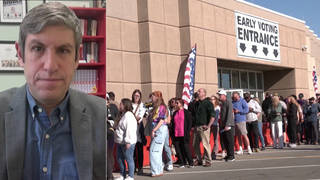
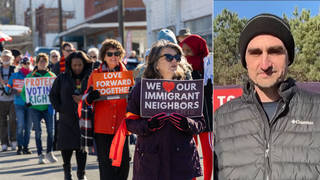
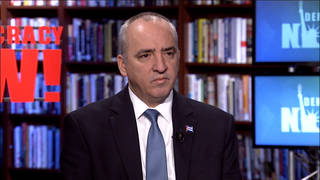
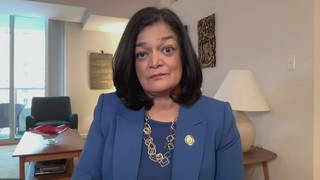






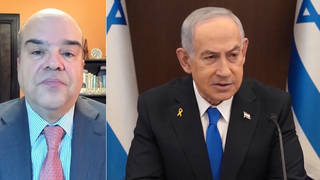
Media Options